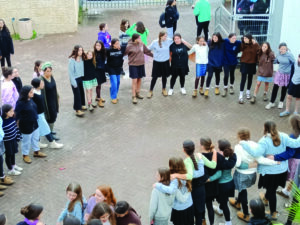By the time Hadas (Addis) Malada made it to Israel at age 4, after a grueling journey from Ethiopia that included walking on foot for weeks with her parents to Sudan and a stay at a refugee camp there, almost no one thought she would survive. Malnourished, with malaria and measles, Hadas was hospitalized upon her arrival in Israel and took several months to recover.
Fortunately, she doesn’t remember the punishing passage to Israel. Her first memory is of landing at Ben-Gurion airport in 1988, after being airlifted from Sudan, and of Soroka hospital in Beersheva, which “was actually a very positive experience for me,” she said, with a laugh. Her stay there as a child is what inspired her interest in medicine and her desire to become a doctor.
After attending the Dina and Moses Dyckman Ulpanat AMIT in Beersheva, Hadas, who was an outstanding student, not only went on to become a doctor—she made history as the first woman of Ethiopian descent to serve as a doctor in the Israeli army.Now, with a special forum she launched and runs, Dr. Malada-Matsree is finding ways to improve health care for Israelis of Ethiopian descent.
“Throughout my life, I have always found ways to connect my experiences to medicine,” she said.
During high school, she volunteered with Magen David Adom, Israel’s national ambulance service, where she spent nights and days gaining experience and then leading first-aid courses. While at AMIT, she also received a scholarship that she used toward taking two university classes in medicine.
“The school introduced me to wonderful people, and I always felt that they believed in me and pushed me forward,” she said of her AMIT experience. “Given the difficult situation at home, they gave me various scholarships and made sure I went on school trips, and also that I participated in the after-school program for students who liked science.”
Dyckman Principal Noa HaCohen, who was Hadas’ teacher in 12th grade, recalls how she had signed up for a prep course for the psychometric text and had worked to pay for it herself. “Even then she was very special,” said HaCohen. “She knew she wanted to go far and was highly motivated, but also deeply humble. Hadas was determined to reach the goals she set for herself.”
After high school, Hadas entered the academic atuda program, which enables graduates to defer their draft, and allows them to attend university prior to their military service. (After completing their studies, they join the army and serve in a position that fits the professional knowledge.)
“I wanted to do significant army service and also make my way toward becoming a doctor,” she said, adding that the first year was extremely challenging because she was working while attending medical school to help support her family. “After the first year, two things happened: I began to acclimate and find a way to balance everything, and a number of social organizations came forward to support me as an Ethiopian woman in medical school.”
Hadas served for five years as a medical officer in the Israeli army and still performs reserve duty. Today she is specializing in family medicine because it allows her to have more of an impact on her patients’ lives.
“When you work with patients on an ongoing basis, when you look at the person as a whole entity, you can really make a difference in people’s lives,” she said.
Hadas is making a difference in more than just her patients’ lives, however. She is spearheading efforts to improve health care for Israelis of Ethiopian descent, to make Israel’s medical system more accessible to them, and also to renew Ethiopian-Israelis’ trust in the system after several controversial and racist incidents involving their community. Her initiative recently landed her on TheMarker’s list of 20 female trailblazers in medicine.
She was part of a committee that helped overturn a Health Ministry ban on blood donations from Ethiopian immigrants to Israel, which drew outrage after Israeli media revealed in 1996 that blood from Ethiopian-Israelis was routinely being destroyed by Magen David Adom, which manages the national blood bank.
“As a doctor in the IDF, I would recruit soldiers for blood-donation campaigns at the base, but I could not contribute because of my origin,” she told TheMarker. “This was very hard, and deeply insulting. I’m good enough to be a doctor and take blood from patients, but not to donate blood. The committee’s decision [to overturn the ban] is an important change in helping rebuild the faith of Ethiopian immigrants in the health system.”
The other episode that elicited widespread condemnation was the revelation that many Ethiopian women who immigrated to Israel were coerced into taking or given Depo-Provera injections without their consent or an explanation about the purpose of the medication (a contraceptive) or its side effects.
The forum to advance health care among Ethiopian-Israelis, which Hadas launched, works to help members of the community better understand medical forms, which she said, are rarely translated into Amharic; bridges cultural gaps by explaining medical terminology to patients; uses Ethiopian-run TV and radio programs to better explain medical services; and also works to gain greater representation for Ethiopian-Israelis on various medical committees.
While she has faced racism herself in medical school and while trying to rent an apartment, Hadas avoids focusing on those experiences and emphasizes the positive—something she tries to convey to younger Ethiopian-Israelis as well. For the past 13 years, she has volunteered at multiple organizations, including one that reaches out to Ethiopian youth in the periphery to teach them about the importance of education.
“They don’t have anyone to believe in them and they don’t believe in themselves,” she said of the children she encounters. She impresses upon them that they are worthy—and that they should dream big and aspire to become something. She is living proof of what is possible when you set your sights on a goal.
—
Photo: Yehuda Lakhiani





